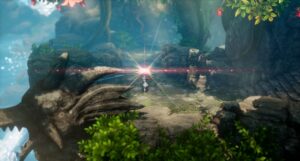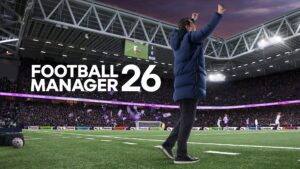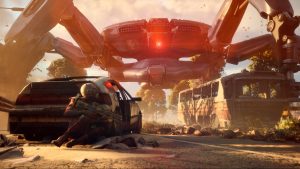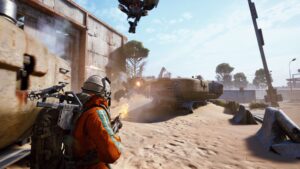
Monster Jam Showdown is the latest game in the licensed series and it releases August 29th on PS4/PS5, Xbox Series S/X, Switch, and PC. This year’s Monster Jam emphasizes its single-player Showdown mode, which houses the game’s many different event types as well as progression and truck unlocks. There’s not a lot of meat on this campaign mode other than trying out the different events. As such, most of the enjoyment I got out of Monster Jam Showdown came from the dynamic physics within the game’s driving model.
Before delving into the scant few modes that Monster Jam Showdown supplies, it’s worth breaking down the driving mechanics and feel of the controls. This is one aspect of the game that I quite enjoy. These eight-ton monsters feature dual-steering turning, with each set of wheels controlled by a separate thumbstick. The right thumbstick rotates the rear wheels, perfect for sharp 180-degree corners and drifts. What happens when you turn with both thumbsticks? Your truck starts circling in place, scoring you some style trick points in return. The variability in the dual-steering controls and what you can do with the independent sets of wheels is one of the highlights of the game.
Much of the success of Monster Jam Showdown’s dual steering controls is owed to the game’s consistent and impressive physics. These trucks feel every bit of the 12,000 pounds that they are. You feel the weight transfer of these beasts when they slide off track from a particularly hard corner or collapse from a wheelie. It’s impressive how you can freely move the trucks around in any direction and they’ll respond more or less how you’d expect. I especially enjoy spinning on the side of two wheels maniacally until the truck flops around in an unhinged fit.
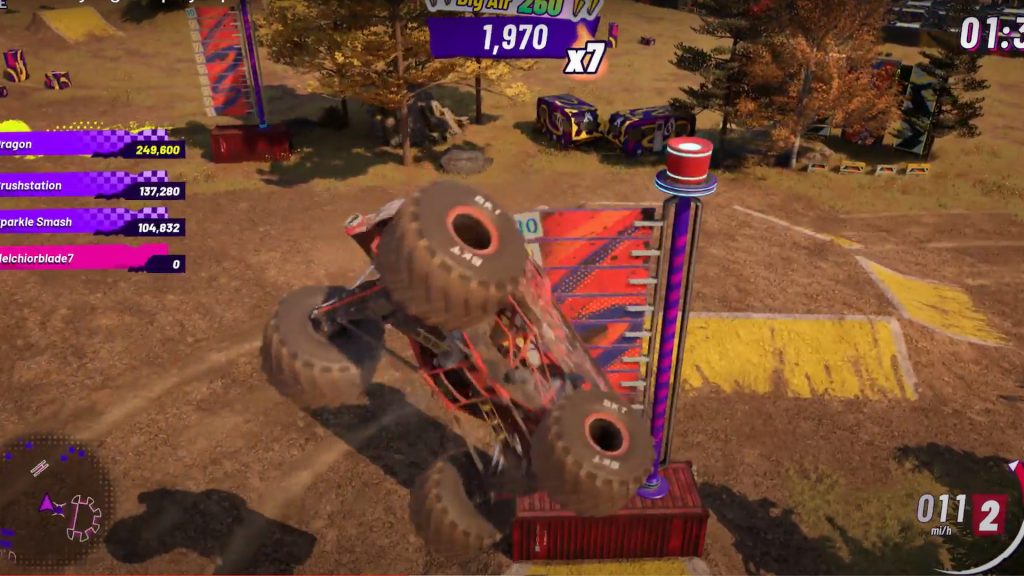
"The physics allows a full range of movement, both on the ground and in the air"
Of course, you’ve gotta be careful whenever you flip around these trucks willy-nilly since you may beat up your rig. Monster Jam Showdown has a pretty good damage model for vehicles and the surrounding environmental props. Panels get stripped off the truck body until you bang it up so bad that it’s just a carriage on top of giant wheels rolling around. The damage is purely cosmetic though, so there’s no performance penalty for crashing your truck besides the wasted time recovering and getting back on track.
You’ll see plenty of the game’s damage model as you attempt any of the game’s numerous stunts. Stunts are performed by utilizing the physics to tilt and flip your truck around. If you’ve played the Trials games, the familiarity of holding down the control stick to backflip and then straightening out the vehicle upon landing is apparent. I like how organic it feels to orient and rotate the truck in mid-air, and how the weight of these beasts still manages to keep them from feeling too flimsy.
Now, I do consider the driving physics to lean more into a simcade style rather than arcade. For one, there’s hardly any traction with these trucks. Almost every corner requires you to break a bit before turning. And then, you have to be careful not to go too hard on the throttle while turning, since the sheer power of these massive trucks will slide and drift off track all too often. You’ll find the driving mechanics familiar enough if you’ve played rally racers, but I wouldn’t quite call this an easy arcade racer as the promotional material states. The demanding weight of these eight-ton machines requires some patience to get used to their hefty frames.
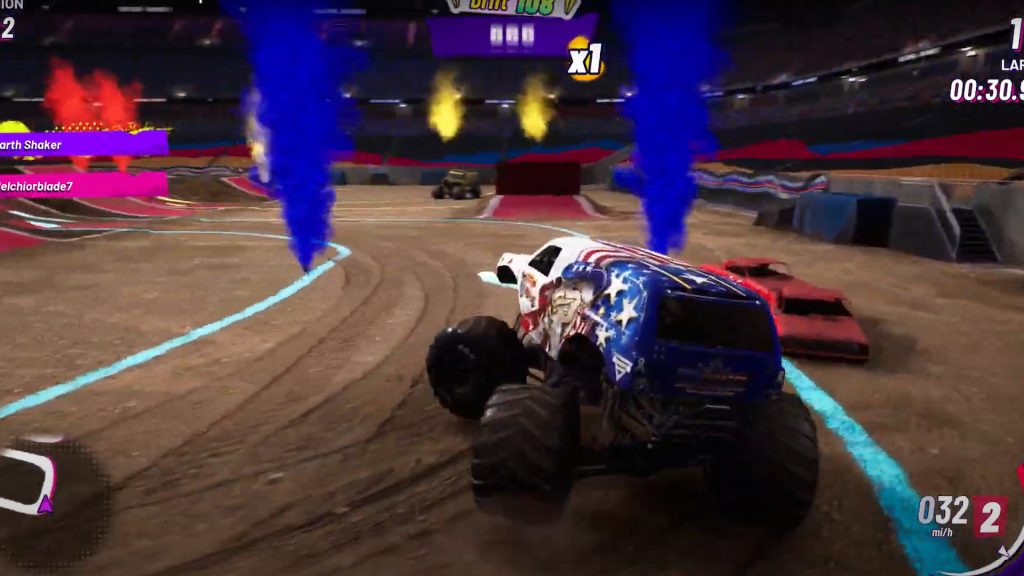
"Turning corners requires careful throttle control, lest you drift off-track"
Once you get used to how one truck drives, you’ve already gotten used to them all. Every truck that I’ve driven so far in Monster Jam Showdown feels identical to one another. I spent a solid half-hour just testing each truck for differentiating characteristics, but to no avail; the way they turn, accelerate, and distribute their weight all feel the same. This realization was a massive letdown for me. One of the main draws of monster truck games is their roster of uniquely styled trucks. They certainly look distinct from one another; the iconic daunting shape of Gravedigger and the campy fun that Zombie brings give off different vibes. Yet they drive exactly the same, negating any strategy involved in choosing a particular truck. Just as disappointing is the shared exhaust note that comes from every single truck. Yes, that’s right, every truck sounds identical, which, if you know your V8s, just isn’t the case with real trucks.
The main attractions of Monster Jam Showdown are the online multiplayer matches and the single-player Showdown mode. You can play with others online in a variety of 8-player matches or even set up a tournament. If you’d rather play with others locally, there’s also split-screen two-player matches that you can play. There are around 10 different activities that you’ll be engaged in throughout your time in these modes. These range from typical circuit racing, head-to-head, best trick, and the fan-favorite freestyle, which gives you free rein to pull off the highest stunt score inside a large open stadium. There’s not much to be surprised about here coming off of past Monster Jam games. I do find it strange that you can’t select the match type and track you want from a menu but instead, have to play them within the multiplayer or Showdown mode to access them.
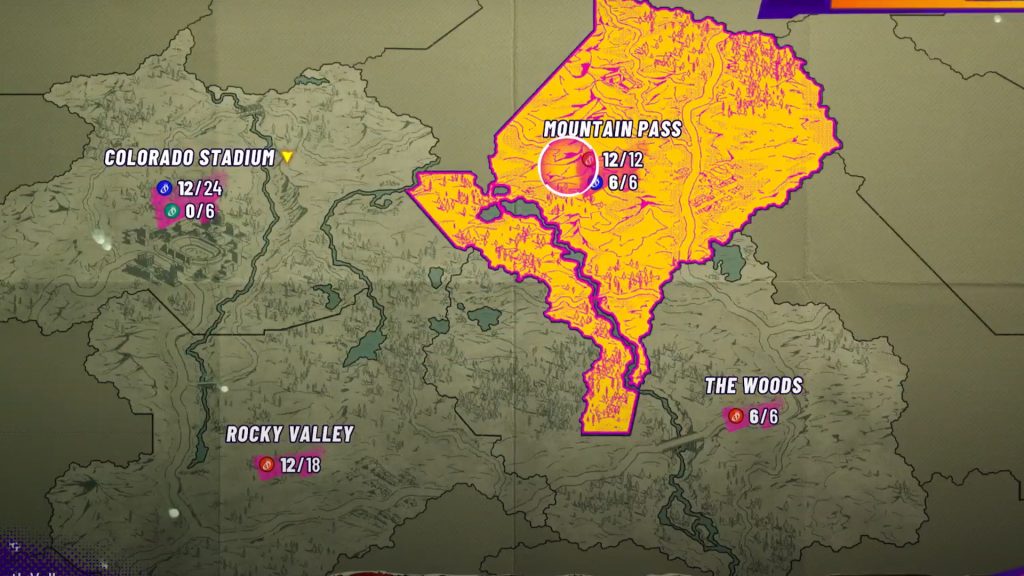
"There are three regions with multiple zones each in Monster Jam Showdown."
Showdown mode is basically this game’s big single-player campaign, and I find it pretty underwhelming for several reasons. While there are three distinct environmental regions, there just aren’t enough tracks or unique stadiums within them. Death Valley, Colorado, and Alaska feature unique terrains and attractive visuals but don’t offer enough variety in their courses. You’re often playing the same track with a different match type. Also, progression within Showdown is uninspired, merely consisting of earning badges based on your position in the match and then going up against a monster truck ‘boss battle’ once you’ve earned enough. You unlock new zones within each of the three regions as you progress and level up your truck as well as earn new trucks along the way.
I’m not expecting Showdown to feature a rich narrative or anything, but it needs some extra zest for me to be invested in it. So far, the only reason I play Showdown is because it’s literally the only way to experience the game’s tracks other than the online offering. Besides progressing in Showdown and taking a gander at the multiplayer offerings, there’s not much else to do in Monster Jam Showdown. Sure, there’s a Garage menu to upgrade trucks and apply pre-made liveries, but even the upgrading is binary and underbaked. Just push a button and it boosts the truck’s performance automatically, no individual stats or mechanical parameters to speak of or account for.
The final nail in the coffin regarding the experience as a whole is the mind-numbingly generic music. There’s not that many musical tracks to begin with, and each one is just as irritating as the last, with repetitive percussion sections and an almost bland sound to it all. That said, you can always just turn the music off and enjoy the sounds of the engines, but with every truck sounding identical there’s really no point in doing that either. Like the generic sounds, the menu design is one that tastelessly follows the trends of other live service games. The graffiti ribbon style is wearing thin on me at this point, especially when it’s as plainly implemented as it is in this game.
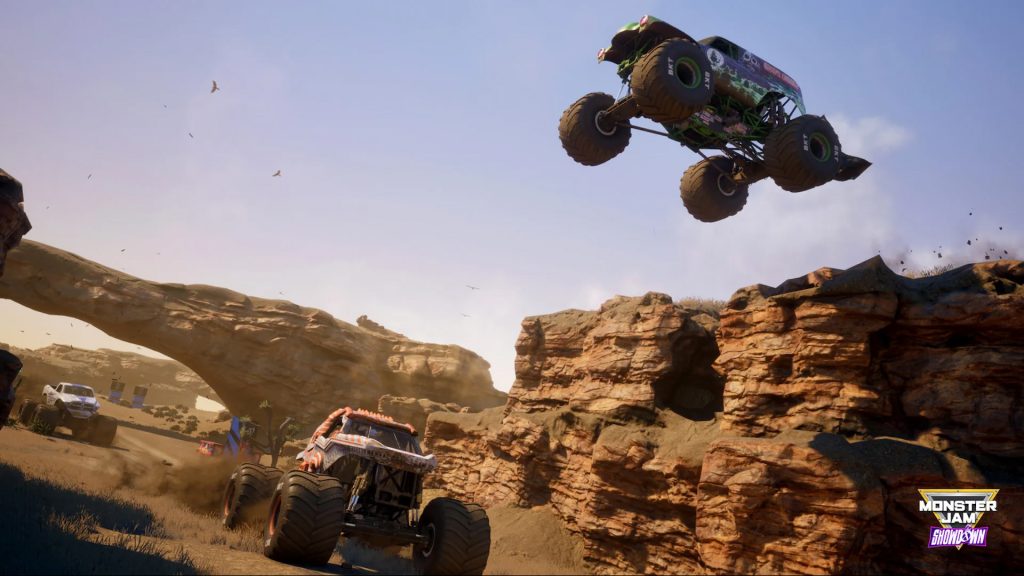
"Tracks loop in on themselves occasionally."
I really wanted to love a monster truck game like this. Racing games are a genre in desperate need of more creative arcade experiences. We’ve been seeing more and more arcade racers play it safe with live service models and generic modes, and it’s unfortunate to see Monster Jam Showdown join that group. The driving physics are a treat at least, salvaging an otherwise forgettable racer stuck within a forgettable structure.
This game was reviewed on the PlayStation 5.
Dual-steering controls are a delight; Physics-based driving feels just right, making tricks feel organic rather than binary.
All trucks feel the same with no identifiable driving characteristics; Music is repetitive and generic and all the trucks sound the same; Lackluster Showdown mode with a lack of compelling progression.











